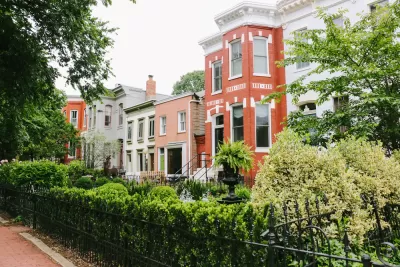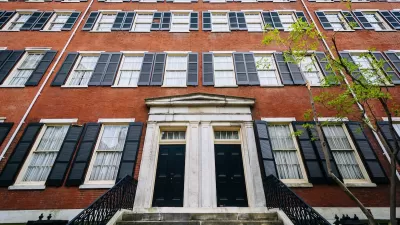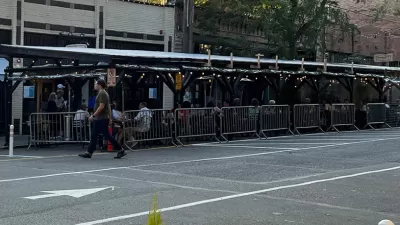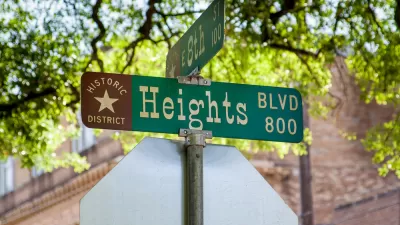A strongly worded opinion piece calls out historic preservation as a tool of the affluent urban elite.

Binyamin Appelbaum, a member of the editorial board of the New York Times, writes a criticism of historic preservation in the wake of a controversy about solar panels on historic homes in the historic district of Capitol Hill in Washington, D.C, where Appelbaum lives.
Here's how Appelbaum summarizes the conflict:
Humans don’t like change, so it’s not surprising that historic preservation laws have become quite popular. There are now more than 2,300 local historic districts across the United States, and I know many people who would like to have their own neighborhood frozen in time.
But historic preservation comes at a cost: It obstructs change for the better. And while that price is generally invisible, it is now on public display because of the city’s efforts to prevent Washington homeowners in historic neighborhoods from installing visible rooftop solar panels.
Appelbaum describes some of the very strict rules the Capitol Hill historic district has for alterations to homes in the area, and with some of these restrictions it shouldn't be hard to imagine that solar panels aren't welcome, even in the midst of climate change. An October controversy over a D.C. homeowner's petition to add solar panels created an uproar, leading to some changes that will make it easier to "a little easier to win permission to put solar panels on historic homes," according to Appelbaum, but "the fact that Washington continues to impose any aesthetic restrictions on rooftop solar panels is still a problem — and it is emblematic of the broader problems with preservation."
That problem, according to Appelbaum, has less to do with preserving history, and more to do with preserving "the lifestyle of an affluent urban elite."
FULL STORY: When Historic Preservation Hurts Cities

Planetizen Federal Action Tracker
A weekly monitor of how Trump’s orders and actions are impacting planners and planning in America.

Maui's Vacation Rental Debate Turns Ugly
Verbal attacks, misinformation campaigns and fistfights plague a high-stakes debate to convert thousands of vacation rentals into long-term housing.

San Francisco Suspends Traffic Calming Amidst Record Deaths
Citing “a challenging fiscal landscape,” the city will cease the program on the heels of 42 traffic deaths, including 24 pedestrians.

Amtrak Rolls Out New Orleans to Alabama “Mardi Gras” Train
The new service will operate morning and evening departures between Mobile and New Orleans.

The Subversive Car-Free Guide to Trump's Great American Road Trip
Car-free ways to access Chicagoland’s best tourist attractions.

San Antonio and Austin are Fusing Into one Massive Megaregion
The region spanning the two central Texas cities is growing fast, posing challenges for local infrastructure and water supplies.
Urban Design for Planners 1: Software Tools
This six-course series explores essential urban design concepts using open source software and equips planners with the tools they need to participate fully in the urban design process.
Planning for Universal Design
Learn the tools for implementing Universal Design in planning regulations.
Heyer Gruel & Associates PA
JM Goldson LLC
Custer County Colorado
City of Camden Redevelopment Agency
City of Astoria
Transportation Research & Education Center (TREC) at Portland State University
Jefferson Parish Government
Camden Redevelopment Agency
City of Claremont





























